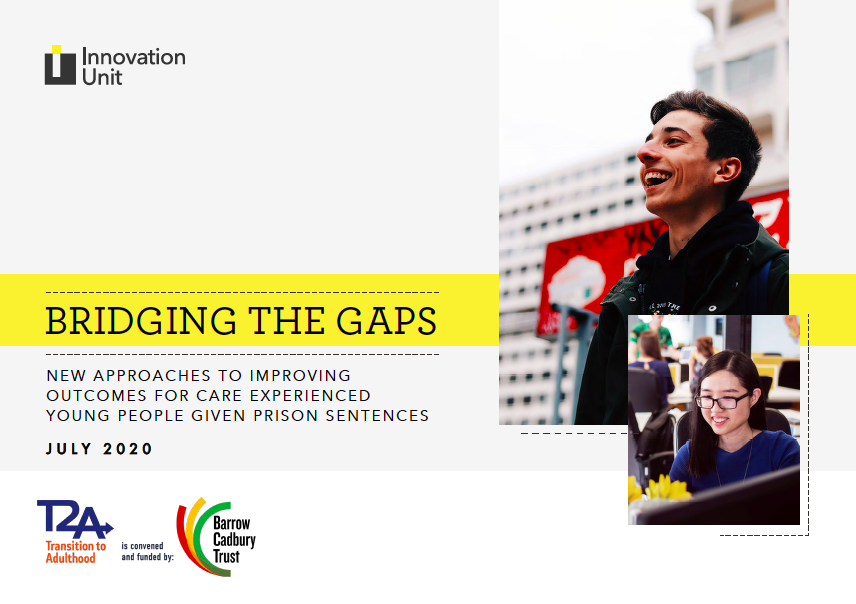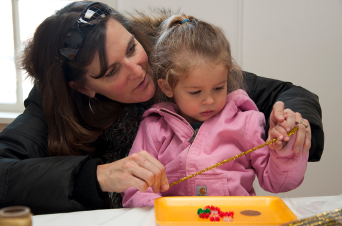
Bridging the Gaps
blog | 31 Jul 2020
NEW REPORT: Bridging the Gaps – new approaches to improving outcomes for care experienced young people given prison sentences.
We know that approximately 25% of adult prisoners have experienced care, despite only 1% of the population growing up in care. We also know that care experienced young people aged 18 to 25 who commit a crime are more likely to reoffend.
Innovation Unit has been working on a three-phase project to understand and address the issues facing this vulnerable group while in prison and on release to help break the cycle early in their lives.
Click the image to download the report.
Our phase one scoping exercise shows that young people’s care experiences are not identified and supported early enough in the justice system. When support is available, it is frequently uncoordinated and fragmented between prison, probation and leaving care services. Often the young people struggle with poor mental health as a result of childhood trauma, abuse and neglect. They frequently leave prison without support for this and with limited access to employment due to their criminal records.
As well as looking at the issues, we looked for answers. Our research, funded by the Oak Foundation, showed that family relationships and positive personal support networks could help prevent reoffending and that frontline professionals from different agencies could support them more effectively, if they had a more co-ordinated approach and an earlier understanding of these young people’s needs.
In phase two, we looked at how to improve family relationships/personal support networks and co-ordinate frontline intervention, working closely with many partners in the West Midlands who know the system inside out: young people with experience of care and prison, HM Prison service, the National Probation service, local Community Rehabilitation Companies, Local Authority care leaving services (Birmingham, Wolverhampton and Coventry), National Leaving Care Benchmarking Forum (Catch-22), Care Leavers Association, Prison Reform Trust and Barnado’s.
Together we tested two solutions, with funding from Barrow Cadbury:
First, we looked at creating a long term network of personal support for the young person. Working with a single professional, called a Lifelong Links practitioner, the young person identifies a list of friends, relatives, and adults they’d like in their network, including people like previous foster carers, a family member or a sports coach. The Lifelong Links practitioner finds the people, invites them to a meeting with the young person, and together they agree how to support the young person while in prison and on release. The Lifelong Links approach, developed by Family Rights Group has seen young people’s networks increase by an extra 21 adults, according to an independent evaluation.
Next, we looked at creating a shared plan and a better connected network of professional support. Currently, statutory plans rarely connect across prison, probation and staff from the care leaving service.
In the next pilot stage, we will start with care experienced peer mentors in prison meeting all young people on entry to prison and encouraging them to self-identify as having experienced care, explaining the support on offer.
Once identified, a prison offender manager (POM) is then allocated to the young person. The POM will link up with the young person’s personal advisor from the care leaving service who often will have worked with the young person before prison. The POM will make sure the young person’s voice is heard and services are co-ordinated at sentence and resettlement planning meetings between the prison service, the probation service, the local authority and the young person themselves. This process will be overseen by the prison’s Care Leavers Champion to ensure that the protocol is followed. The Lifelong Links practitioner ensures co-ordination between the personal and professional networks.
When we tested this way of working, our approach co-ordinated housing for a young person due to be released on Christmas Eve. Without a family member around in the weeks before release, the personal advisor, CRC worker and probation officer secured accommodation and organised for an early release of keys, ensuring the young person was housed over the Christmas period.
Now, we’re ready to pilot our approach with every young person 18-25 (male and female) who has been in care and are now serving sentences in four prisons in the West Midlands group. We estimate that is approximately 50 young people from Birmingham, Wolverhampton and Coventry at any one time.
And in the next two years we plan to reach every young person who has been in care in any of the West Midlands Authorities, who are serving their prison sentence in the West Midlands group of prisons.
To achieve our ambition, we are in discussions about securing the final funding for the pilot from both charitable and statutory sources.
We’re confident our innovations will improve outcomes for young people who have experience of care and are now in prison and will save money in the criminal justice system. We know we’ll be successful because the solutions have been designed by those who know the system best, and we have prototyped successfully with a small number of young people.
Most importantly, there is a momentum and appetite for change within the key stakeholders who want to challenge the system to get better outcomes for young people who fall into the cycle of reoffending.
To work with Innovation Unit on the pilot , contact jessie.ben-ami@innovationunit.org

Bridging the Gaps
29 Jul 20

Falling through the gaps – new research into care leavers’ experiences
A new research report reveals key insights about the experiences of care leavers leaving prison, and the opportunities and challenges they face following release.
28 Feb 19

Learning from a crisis: transforming children’s social care
01 Jul 20